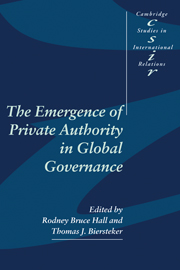Book contents
- Frontmatter
- Contents
- List of figures
- List of tables
- List of contributors
- Preface and acknowledgements
- Part I Introduction: theorizing private authority
- Part II Market authority: globalization and “globaloney”
- Part III Moral authority: global civil society and transnational religious movements
- Part IV Illicit authority: mafias and mercenaries
- 8 Transnational organized crime and the state
- 9 The return of the dogs of war? The privatization of security in Africa
- Part V Conclusions and directions
- Bibliography
- Index
- CAMBRIDGE STUDIES IN INTERNATIONAL RELATIONS
8 - Transnational organized crime and the state
Published online by Cambridge University Press: 22 September 2009
- Frontmatter
- Contents
- List of figures
- List of tables
- List of contributors
- Preface and acknowledgements
- Part I Introduction: theorizing private authority
- Part II Market authority: globalization and “globaloney”
- Part III Moral authority: global civil society and transnational religious movements
- Part IV Illicit authority: mafias and mercenaries
- 8 Transnational organized crime and the state
- 9 The return of the dogs of war? The privatization of security in Africa
- Part V Conclusions and directions
- Bibliography
- Index
- CAMBRIDGE STUDIES IN INTERNATIONAL RELATIONS
Summary
One of the most important characteristics of global politics at the beginning of the twenty-first century is the multiplicity of actors. An environment that, for a long time, was regarded as the domain of states is now seen by most commentators as much more complex: states share the stage with a wide variety of non-state or “sovereignty-free actors,” ranging from transnational and multinational companies with global markets to non-governmental organizations concerned with good causes such as peace and disarmament, preventing further environmental degradation, famine and disaster relief, poverty alleviation, and the like. There is also a new breed of criminal actor – transnational criminal organizations – that is interested not in the pursuit of good, but in the pursuit of wealth, and the use of criminal means to obtain it. Transnational criminal organizations are not new; they have been around as long as there has been a demand for the smuggling of goods across borders. The difference today, however, is that there are more of them, they are more varied, and they possess greater wealth and power than ever before. Furthermore, whereas most states in the past seemed to have the capacity to keep organized crime under control, this is no longer so obviously the case. Indeed, transnational organized crime has emerged as a major challenger to individual states – especially those in transition and those that are still developing economically – and to international governance. Against this background, this chapter seeks to do several things:
to locate the relationship between organized crime and states in the broader context over the debate over the future of the state. […]
- Type
- Chapter
- Information
- The Emergence of Private Authority in Global Governance , pp. 161 - 182Publisher: Cambridge University PressPrint publication year: 2002
- 15
- Cited by



